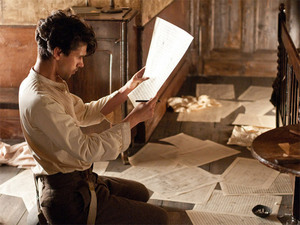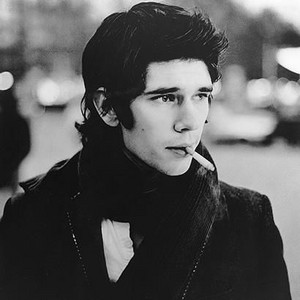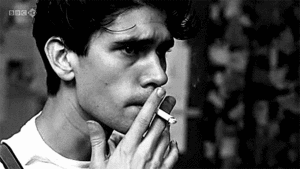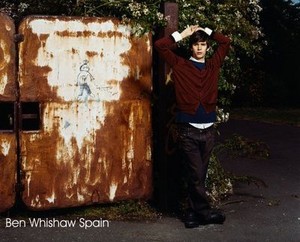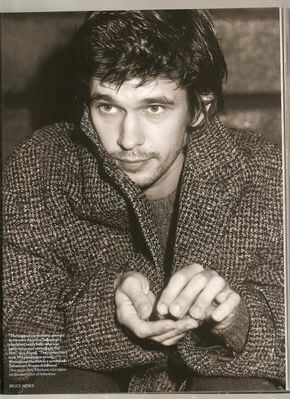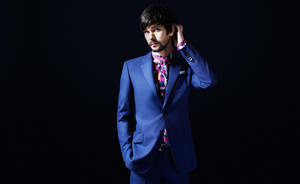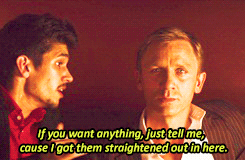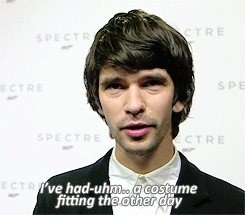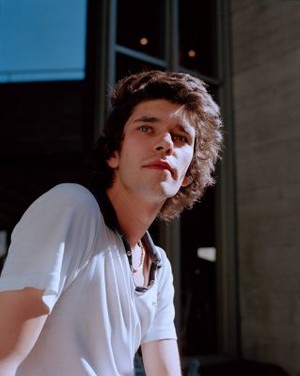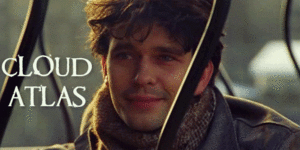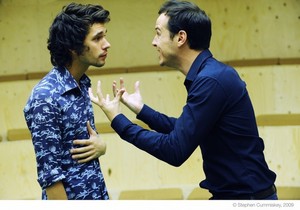IAR: To begin with, is one of the most exciting aspects of being in a project like this the opportunity to play several different characters and really be part of an ensemble of actors as apposed to being number one or number two on the call sheet? Is that why you wanted to be in this movie?
Ben Whishaw: Definitely. None of us really knew what that would entail until we were there doing it. It did create a very special atmosphere and we have to thank Tom Hanks for guiding us in that because he's such a powerful person. There are lots of powerful people in the cast of course, but if he hadn't been so generous I wonder if it would've worked quite so well as it did. That was definitely a massive part of the appeal, but also just to be not only working with actors playing multiple roles, but having three directors juggling these stories.
That leads me to my next question, what is it like working with three directors on one film? Does that change the dynamic on set?
Whishaw: Yes, because even though I didn't really get to work with the Wachowskis that much I was still working with them because the whole film is theirs. It’s the conception of all three of them. It's not just Tom Tykwer’s conception; it's the three of theirs so it's really special in that respect. I'm amazed by how they've managed to do it personally and creatively.
Tom Tykwer and author David Mitchell have both stated that one of their favorite moments in the film is when you are playing the record store clerk in the ‘1970s selling a piece of music written by your character Robert Frobisher decades before. Did you realize when you were shooting that scene that it would be such a nice tie-in for the audience, and was that written in the script or did the directors come up with that on set?
Whishaw: I think we knew that it would be a lovely one of those moments. The film is full of those lovely moments and yes; that was in the script. I remember that being in there quite early on that I'd be selling my own record.
Unlike many of your co-stars, you did not have to wear a lot of special effects makeup in the film. Were you glad to dodge that bullet or do you wish you could have been less recognizable in some of your roles?
Whishaw: When I play Hugh Grant's wife in that sort of brief cameo performance I originally did have a lot more makeup, but they took it all away because I think in the end they just gave me a bigger forehead. But I did have sort of jowls and creases, but it was so obscured me so much that Tom was like, “We have to be able to see a bit of the person underneath.” The pleasure of the film is to be able to spot everybody even if they're completely gone. You have to get a flash of Halle Berry or a bit of James D'Arcy underneath coming through. That's the pleasure of it.
As an actor, did you see any sort of connection between the characters that you were playing? Were you playing your roles like they were all the same soul reincarnated, or did you see them as completely different characters?
Whishaw: I have to say I totally didn't. I didn't even think that was what we were supposed to do. You know, I'm only just discovering that some actors did that because it was so personal for each person. I thought for me that the story really was about this one soul who is identified each time by the birthmark. That was the soul I thought we were, the same soul being reincarnated. I didn't think it was a story about Robert Frobisher becoming the Store Clerk and then becoming Georgette. But some people did, some actors played it that way and I think you can, but I didn't. I saw the idea of having us all play multiple roles just being more of a fun kind of concept, sort of playful thing.
There are so many different storylines going on in the film, now that you have seen the movie in its entirety, do you have a favorite sequence that perhaps you were not directly involved in as an actor?
Whishaw: I find that Sonmi (Doona Bae) story deeply moving. I think that's the heart of the film for me. The whole idea that this manifesto that you see her speaking as she's watching her lover get shot is the thing that is being read centuries later by this post apocalyptic society, I love that stuff. And how you see her being worshipped in this other time, that's such a genius thing to show. It's like if you could tell a story about Jesus Christ. If we could see what Jesus Christ was like and then see how he was worshiped, it's such an incredible idea to play with. But that's only one of the ideas in the film. I mean there's a whole other thing about oppression and liberation from all different kinds of oppressive forces. Love of course is a massive thing and so is creativity, and art making. So the movie is many different things. Actually, there are bits that I still really don't understand. There's something to do with buttons. There's some footage focusing on buttons in the Adam Ewing story, and I'm like what is the significance of these buttons? Its maybe a little mystic, but twice I saw it and I'm sure I'm missing something with this footage because we're focusing on this.
Tom Hanks has said that he feels the movie is about the fight for freedom, but author David Mitchell stated that he thinks it’s the opposite, that the story is really about oppression and slavery. Do you agree with Mr. Hanks, or Mr. Mitchell, or do you think they are both right?
Whishaw: I think in the novel is much more as David describes it. It's about the generations in a way kind of eating each other, destroying what's gone before and then the battles and power struggles of enslavement and so forth. But I think that the film is weighed much more towards something more hopeful actually.
Had you read the book prior to being cast in the film, and if not, did you choose to read it before you began shooting?
Whishaw: Once I'd been cast I chose to read it and it was really helpful because my main story, the Frobisher story, is really different than the book. After I read the book I was like, oh, Tom it's such a shame we have to cut all this stuff out! And he said, “Yeah, but look at what we've done!” He had to really talk me through the how they transferred the climatic moments of the novel into a new way in the film. It's pretty different actually. I think the key moment in my story is when he finds himself falling in love with this old composer, which is not something he'd anticipated because I think he goes in thinking that he's the one with the power manipulating the old man. That he's the one who is the screamer, but actually he's not as in control of this relationship as he imagines he is.
A lot of your scenes are with Oscar-winner Jim Broadbent, what was it like working with him?
Whishaw: My God, I love him so much! He's just amazing. I think he's the sort of person who can channel things. I think he's got a kind of channeling gift. I don't know, but he's so creative and such a brilliant comedian as well. He's so funny. He brings such a complete character. As a man he's quite self-contained and quite reserved in a way, hard to get to know. But he’s lovely, and to act opposite of him is a great pleasure.
I understand that Tom Tykwer directed all of your scenes as Frobisher but did you have a chance to be directed by the Washowskis at all?
Whishaw: Yes but only in very small capacities. It hadn't really occurred to me before, but it is true that although I didn't work with them very much directly, I was still working with them because the film belongs to all of them. The three of them have conceived it together, so it would’ve been a disaster if Tom had gone away and made his bits in total isolation. All the time they were communicating with each other. Even at the script level they knew where certain cuts were going to be, and how exactly that was going to happen. That someone's going to open a door and go from one time period into something three hundred years later.
Before we run out of time, I need to ask you about playing Q in Skyfall. This will be the first introduction of the beloved character into Daniel Craig’s James Bond series, which previously has stayed away from using classic Bond-type gadgets. Does the inclusion of Q in Skyfall mean that 007 will be using some classic gadgets in the new film?
Whishaw: We're in a new territory for James Bond now because Skyfall is the first time that a Bond movie is not based on a Fleming novel, and all of those books of course were written in the ‘50's so they were for a very different time in the world. So now that we're up to date, I think the writers thought, who would Q be now? I think they were inspired by someone like Mark Zuckerberg because he’s kind of using technology in really radical ways to change the word. So Q is sort of a computer genius really, this kind of hacker. There isn't that much gadgetry really because, and this is sort of the joke, we all have gadgets now don't we? It's not so much the gadgetry, it's how you use it, how you manipulate these computer systems and so forth. Part of Skyfall is this sort of cyber war that's going on. I think they used that really well because it's chilling what you can do with the flick of a button.
I recently had an opportunity to speak with Bond producer Barbara Broccoli and she mentioned that Q has a very pivotal role in Skyfall, what did she mean by that?
Whishaw: Well, it's nice actually because he not only sort of gives Bond his gadgets for his mission, but he ends up being involved in the most pivotal moment in the story really, which is lovely for me.
Did you look at Desmond Liewelyn or John Cleese’s performances as Q in previous Bond movies as inspiration?
Whishaw: Of course I remembered them from seeing the films, but I deliberately didn't go back and watch them because I thought it would be terrible to have them too much in the forefront of my mind. I thought that the writers did such a brilliant job of keeping one foot in the past and bringing it up to date. I thought that I could trust that it's there and just do my own thing with it.
It was recently announced that Daniel Craig has signed on to do at least two more Bond films, are you attached to return as well?
Whishaw: Hopefully. I think I'm due to do more if they like me, if they want to keep me on.
Did you get to have any scenes with Judy Dench in Skyfall?
Whishaw: No. But I’m about to start a play with her. I can't wait. I love her so much.
Finally, is true that you will be appearing in Robopocolypse? Are you excited to work with Steven Spielberg?
Whishaw: I am. I don't really want to talk about it because I haven't had one hundred percent confirmation that it is happening, but I have met him. We're due to make it. Maybe it's a contractual thing because it's taken a while, but I think were due to do it in London.
Have you read the script yet?
Whishaw: No, I've read the book. I gather it will be quite different from the book. But this was the problem; the script was sort of taking a while to get right.
Ben Whishaw: Definitely. None of us really knew what that would entail until we were there doing it. It did create a very special atmosphere and we have to thank Tom Hanks for guiding us in that because he's such a powerful person. There are lots of powerful people in the cast of course, but if he hadn't been so generous I wonder if it would've worked quite so well as it did. That was definitely a massive part of the appeal, but also just to be not only working with actors playing multiple roles, but having three directors juggling these stories.
That leads me to my next question, what is it like working with three directors on one film? Does that change the dynamic on set?
Whishaw: Yes, because even though I didn't really get to work with the Wachowskis that much I was still working with them because the whole film is theirs. It’s the conception of all three of them. It's not just Tom Tykwer’s conception; it's the three of theirs so it's really special in that respect. I'm amazed by how they've managed to do it personally and creatively.
Tom Tykwer and author David Mitchell have both stated that one of their favorite moments in the film is when you are playing the record store clerk in the ‘1970s selling a piece of music written by your character Robert Frobisher decades before. Did you realize when you were shooting that scene that it would be such a nice tie-in for the audience, and was that written in the script or did the directors come up with that on set?
Whishaw: I think we knew that it would be a lovely one of those moments. The film is full of those lovely moments and yes; that was in the script. I remember that being in there quite early on that I'd be selling my own record.
Unlike many of your co-stars, you did not have to wear a lot of special effects makeup in the film. Were you glad to dodge that bullet or do you wish you could have been less recognizable in some of your roles?
Whishaw: When I play Hugh Grant's wife in that sort of brief cameo performance I originally did have a lot more makeup, but they took it all away because I think in the end they just gave me a bigger forehead. But I did have sort of jowls and creases, but it was so obscured me so much that Tom was like, “We have to be able to see a bit of the person underneath.” The pleasure of the film is to be able to spot everybody even if they're completely gone. You have to get a flash of Halle Berry or a bit of James D'Arcy underneath coming through. That's the pleasure of it.
As an actor, did you see any sort of connection between the characters that you were playing? Were you playing your roles like they were all the same soul reincarnated, or did you see them as completely different characters?
Whishaw: I have to say I totally didn't. I didn't even think that was what we were supposed to do. You know, I'm only just discovering that some actors did that because it was so personal for each person. I thought for me that the story really was about this one soul who is identified each time by the birthmark. That was the soul I thought we were, the same soul being reincarnated. I didn't think it was a story about Robert Frobisher becoming the Store Clerk and then becoming Georgette. But some people did, some actors played it that way and I think you can, but I didn't. I saw the idea of having us all play multiple roles just being more of a fun kind of concept, sort of playful thing.
There are so many different storylines going on in the film, now that you have seen the movie in its entirety, do you have a favorite sequence that perhaps you were not directly involved in as an actor?
Whishaw: I find that Sonmi (Doona Bae) story deeply moving. I think that's the heart of the film for me. The whole idea that this manifesto that you see her speaking as she's watching her lover get shot is the thing that is being read centuries later by this post apocalyptic society, I love that stuff. And how you see her being worshipped in this other time, that's such a genius thing to show. It's like if you could tell a story about Jesus Christ. If we could see what Jesus Christ was like and then see how he was worshiped, it's such an incredible idea to play with. But that's only one of the ideas in the film. I mean there's a whole other thing about oppression and liberation from all different kinds of oppressive forces. Love of course is a massive thing and so is creativity, and art making. So the movie is many different things. Actually, there are bits that I still really don't understand. There's something to do with buttons. There's some footage focusing on buttons in the Adam Ewing story, and I'm like what is the significance of these buttons? Its maybe a little mystic, but twice I saw it and I'm sure I'm missing something with this footage because we're focusing on this.
Tom Hanks has said that he feels the movie is about the fight for freedom, but author David Mitchell stated that he thinks it’s the opposite, that the story is really about oppression and slavery. Do you agree with Mr. Hanks, or Mr. Mitchell, or do you think they are both right?
Whishaw: I think in the novel is much more as David describes it. It's about the generations in a way kind of eating each other, destroying what's gone before and then the battles and power struggles of enslavement and so forth. But I think that the film is weighed much more towards something more hopeful actually.
Had you read the book prior to being cast in the film, and if not, did you choose to read it before you began shooting?
Whishaw: Once I'd been cast I chose to read it and it was really helpful because my main story, the Frobisher story, is really different than the book. After I read the book I was like, oh, Tom it's such a shame we have to cut all this stuff out! And he said, “Yeah, but look at what we've done!” He had to really talk me through the how they transferred the climatic moments of the novel into a new way in the film. It's pretty different actually. I think the key moment in my story is when he finds himself falling in love with this old composer, which is not something he'd anticipated because I think he goes in thinking that he's the one with the power manipulating the old man. That he's the one who is the screamer, but actually he's not as in control of this relationship as he imagines he is.
A lot of your scenes are with Oscar-winner Jim Broadbent, what was it like working with him?
Whishaw: My God, I love him so much! He's just amazing. I think he's the sort of person who can channel things. I think he's got a kind of channeling gift. I don't know, but he's so creative and such a brilliant comedian as well. He's so funny. He brings such a complete character. As a man he's quite self-contained and quite reserved in a way, hard to get to know. But he’s lovely, and to act opposite of him is a great pleasure.
I understand that Tom Tykwer directed all of your scenes as Frobisher but did you have a chance to be directed by the Washowskis at all?
Whishaw: Yes but only in very small capacities. It hadn't really occurred to me before, but it is true that although I didn't work with them very much directly, I was still working with them because the film belongs to all of them. The three of them have conceived it together, so it would’ve been a disaster if Tom had gone away and made his bits in total isolation. All the time they were communicating with each other. Even at the script level they knew where certain cuts were going to be, and how exactly that was going to happen. That someone's going to open a door and go from one time period into something three hundred years later.
Before we run out of time, I need to ask you about playing Q in Skyfall. This will be the first introduction of the beloved character into Daniel Craig’s James Bond series, which previously has stayed away from using classic Bond-type gadgets. Does the inclusion of Q in Skyfall mean that 007 will be using some classic gadgets in the new film?
Whishaw: We're in a new territory for James Bond now because Skyfall is the first time that a Bond movie is not based on a Fleming novel, and all of those books of course were written in the ‘50's so they were for a very different time in the world. So now that we're up to date, I think the writers thought, who would Q be now? I think they were inspired by someone like Mark Zuckerberg because he’s kind of using technology in really radical ways to change the word. So Q is sort of a computer genius really, this kind of hacker. There isn't that much gadgetry really because, and this is sort of the joke, we all have gadgets now don't we? It's not so much the gadgetry, it's how you use it, how you manipulate these computer systems and so forth. Part of Skyfall is this sort of cyber war that's going on. I think they used that really well because it's chilling what you can do with the flick of a button.
I recently had an opportunity to speak with Bond producer Barbara Broccoli and she mentioned that Q has a very pivotal role in Skyfall, what did she mean by that?
Whishaw: Well, it's nice actually because he not only sort of gives Bond his gadgets for his mission, but he ends up being involved in the most pivotal moment in the story really, which is lovely for me.
Did you look at Desmond Liewelyn or John Cleese’s performances as Q in previous Bond movies as inspiration?
Whishaw: Of course I remembered them from seeing the films, but I deliberately didn't go back and watch them because I thought it would be terrible to have them too much in the forefront of my mind. I thought that the writers did such a brilliant job of keeping one foot in the past and bringing it up to date. I thought that I could trust that it's there and just do my own thing with it.
It was recently announced that Daniel Craig has signed on to do at least two more Bond films, are you attached to return as well?
Whishaw: Hopefully. I think I'm due to do more if they like me, if they want to keep me on.
Did you get to have any scenes with Judy Dench in Skyfall?
Whishaw: No. But I’m about to start a play with her. I can't wait. I love her so much.
Finally, is true that you will be appearing in Robopocolypse? Are you excited to work with Steven Spielberg?
Whishaw: I am. I don't really want to talk about it because I haven't had one hundred percent confirmation that it is happening, but I have met him. We're due to make it. Maybe it's a contractual thing because it's taken a while, but I think were due to do it in London.
Have you read the script yet?
Whishaw: No, I've read the book. I gather it will be quite different from the book. But this was the problem; the script was sort of taking a while to get right.


